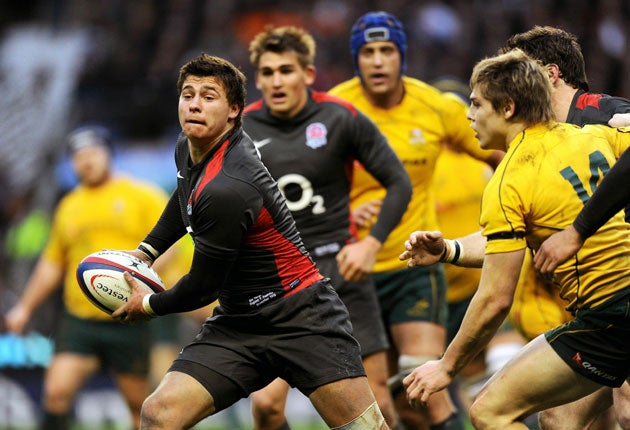Johnson's dynamos are Youngs at heart

Your support helps us to tell the story
From reproductive rights to climate change to Big Tech, The Independent is on the ground when the story is developing. Whether it's investigating the financials of Elon Musk's pro-Trump PAC or producing our latest documentary, 'The A Word', which shines a light on the American women fighting for reproductive rights, we know how important it is to parse out the facts from the messaging.
At such a critical moment in US history, we need reporters on the ground. Your donation allows us to keep sending journalists to speak to both sides of the story.
The Independent is trusted by Americans across the entire political spectrum. And unlike many other quality news outlets, we choose not to lock Americans out of our reporting and analysis with paywalls. We believe quality journalism should be available to everyone, paid for by those who can afford it.
Your support makes all the difference.Youth, they say, is wasted on the young. Never in Australian rugby and now, it appears, not in England either. Notorious for their mistrust of youth, England's inspiration yesterday came from the cradle.
Let us take, as the primary example, one of the great tries scored by England. When Tom Palmer turned over Will Genia, Australia's scrum-half, the lock's feet were on his own line. Ben Youngs had a vital decision to make – kick clear or pass into a big blind side. It was a decision worthy of comparison with that made by France's Pierre Berbizier and Serge Blanco, in precisely the same area occupied by Youngs, in the 1991 Grand Slam decider. They created a miraculous try for Philippe Saint-André.
But 19 years ago, Blanco and Berbizier were among the most experienced of Frenchmen. Youngs celebrated his 21st birthday in September, he was making only his third start for England and his decision was neither to kick nor to pass but to sell a dummy and run. Outside him were Courtney Lawes, 21 (third start) and Chris Ashton, 23 (fifth start). All three made brilliant decisions, Youngs and Lawes in the timing of the pass, Ashton in his use of acres of space to beat Drew Mitchell on an 80-metre run-in.
Remember, too, that when England beat Australia in Sydney in June, the try-scorers were Youngs and Ashton. Youngs, the man of the match, does not know what it is to start a Test against any side other than the No 1 (New Zealand) or No 2 (Australia) in the world.
"He's just a really mature guy," said Martin Johnson, England's manager. "He's played very, very well and the good thing is he's only 21, he'll get better." All of which runs contrary to received opinion, 10 months away from the seventh World Cup, that global success hinges on experience.
Australia have form where youth is concerned. In 1947 a 21-year-old centre, Trevor Allan, took over the leadership of the Wallabies in Britain, Ireland and France. Think of those talented backs of the 1970s, Tony Melrose and Russell Fairfax; the trust placed in Nick Farr-Jones and Michael Lynagh on the Grand Slam tour of 1984; the emergence of the teenaged centres Tim Horan and Jason Little in 1989.
Their back division yesterday had an average age of 23 and had been good enough to beat New Zealand and Wales. Robbie Deans, Australia's head coach, was content at last to give the goal-kicking to the 20-year-old James O'Connor, his match-winner in Hong Kong against the All Blacks a fortnight ago.
O'Connor kicked three and missed four, a tally brought into stark relief by Toby Flood's 100 per cent return. This has been Australia's Achilles heel for too long. O'Connor had the courage to take over from Matt Giteau, ahead of Quade Cooper and Kurtley Beale who are 22 and 21 respectively.
England's trust in youth was reflected in their style of play. As against New Zealand a week earlier they came to play rugby, not to break Australia on the rack of the scrum. In Perth and Sydney in the summer, they dominated the Wallaby scrum; here there were seven scrums in the game, all of which resulted in a penalty or free-kick and gave no platform from which to perform.
That the scrum was a weapon used to good effect against the All Blacks remains true but England's triumph here was the width with which they played. Johnson was at pains to praise the contributions of Mark Cueto (who must have run Youngs close for the individual award), Shontayne Hape and Mike Tindall but his young men took better options.
Early in the game, Youngs ran from defence with Tindall and Flood in an attack which reached Australia's 22, tracked over 60 metres by Ashton who had to come from right to leftto offer support. This new generation will make future opponents think of England ina manner that, hitherto, has seldom been required. The occupants of the cradle are growing up fast.
Join our commenting forum
Join thought-provoking conversations, follow other Independent readers and see their replies
Comments